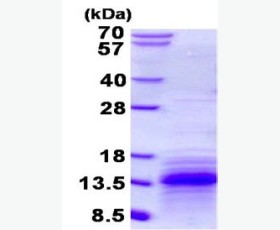Recombinant Human Leucine-Rich α-2-Glycoprotein/LRG1
| Product name: | Recombinant Human Leucine-Rich α-2-Glycoprotein/LRG1 |
| Source: | Human Cells |
| Purity: | Greater than 95% as determined by reducing SDS-PAGE. |
| Buffer Formulation: | Lyophilized from a 0.2 μm filtered solution of 20mM Tris, 20mM NaCl, pH 7.5. |
| Applications: | Applications:SDS-PAGE; WB; ELISA; IP. |
| Storage: | Avoid repeated freeze/thaw cycles. Store at 2-8 oC for one month. Aliquot and store at -80 oC for 12 months. |
| UOM: | 100ug/50ug/200ug/1mg/1g |
| Source | Human Cells |
| Description | Recombinant Human LRG1 is produced by our Mammalian expression system and the target gene encoding Val36-Gln347 is expressed with a 6His tag at the C-terminus. |
| Names | Leucine-rich alpha-2-glycoprotein,HMFT1766, LRG, LRG1 |
| Accession # | P02750 |
| Formulation | Lyophilized from a 0.2 μm filtered solution of 20mM Tris, 20mM NaCl, pH 7.5. |
| Shipping |
The product is shipped at ambient temperature. |
| Reconstitution |
Always centrifuge tubes before opening. Do not mix by vortex or pipetting. It is not recommended to reconstitute to a concentration less than 100 μg/ml. Dissolve the lyophilized protein in ddH2O. Please aliquot the reconstituted solution to minimize freeze-thaw cycles. |
| Storage |
Lyophilized protein should be stored at < -20°C, though stable at room temperature for 3 weeks. Reconstituted protein solution can be stored at 4-7°C for 2-7 days. Aliquots of reconstituted samples are stable at < -20°C for 3 months. |
| Purity |
Greater than 95% as determined by reducing SDS-PAGE. |
| Endotoxin | Less than 0.1 ng/µg (1 IEU/µg) as determined by LAL test. |
| Amino Acid Sequence |
VTLSPKDCQVFRSDHGSSISCQPPAEIPGYLPADTVHLAVEFFNLTHLPANLLQGASKLQELHLS SNGLESLSPEFLRPVPQLRVLDLTRNALTGLPPGLFQASATLDTLVLKENQLEVLEVSWLHGLKA LGHLDLSGNRLRKLPPGLLANFTLLRTLDLGENQLETLPPDLLRGPLQLERLHLEGNKLQVLGKD LLLPQPDLRYLFLNGNKLARVAAGAFQGLRQLDMLDLSNNSLASVPEGLWASLGQPNWDMRDGFD ISGNPWICDQNLSDLYRWLQAQKDKMFSQNDTRCAGPEAVKGQTLLAVAKSQVDHHHHHH
|
| Background | Leucine-rich alpha-2-glycoprotein is a secreted protein and contains 8 LRR (leucine-rich) repeats and 1 LRRCT domain. The leucine-rich repeat (LRR) family of proteins, including LRG1, have been shown to be involved in protein-protein interaction, signal transduction, and cell adhesion and development. LRG1 is expressed during granulocyte differentiation. Levels of the LRG protein are markedly elevated in acute appendicitis and therefore could be used as a diagnostic aid. |














